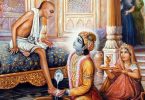Question : In case of King Chitraketu, King Chitraketu accepts the curse of Parvati Devi very happily, Parvati Devi cursed him without knowing full details and Vidura also went to pilgrimage without getting disturbed, both of them did not retaliate/oppose, did not get disturbed and did not try to correct the situation. While in case of Sisupala, Krishna tolerated insult without getting disturbed but after 101 mistakes, Krishna punished Sisupala. I clearly understand that we should not lose our composure and should not get disturbed but how to decide when to react and when to accept it or let it go.
Answer by Romapada Swami:
There is no hard and fast rule as to WHEN one should act strongly when one is offended/wronged vs. simply tolerating it.
In general, as per Krishna’s instructions in Ch 2 of BG, one should tolerate duality, knowing the manifestations of duality to be illusory: BG 2.14.
Krishna acted in relation to Sisupala *not* out of anger or retaliation. He was offering liberation to Sisupala!
Similarly, in Dvaraka Krishna was wrongly defamed and criticized by Satrajit. Krishna showed us what to do: He stood by the truth, and the truth proved Him to be faultless.
There are many examples of our acaryas remaining totally humble in the face of undue criticism springing from envy or ignorance. Listen to the last day of the Vrndavan Yatra to hear the description of Jayadev Goswami’s response to serve physical harm done to him by dacoits. Feeling the Lord’s protection, we can easily forgive aggressors.
The key to know what to do in different circumstances is to remain in a humble service mood. Then only will we be receivers of direct prompts from Krishna as to how to best serve him in different circumstances.







